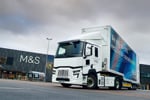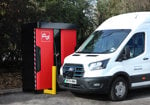Van drivers who have private use of their vehicles currently have a standard taxable benefit of £500 a year. However, the Government is looking at ways of changing the system to reflect the environmental impact of vehicles, which could mean a move to an emission-based system.
But any move away from the most basic system could cause chaos for the commercial vehicle sector, warns Martyn Lewis, director of commercial vehicles at ARVAL PHH.
He said: 'Although information on possible changes to Benefit-in-Kind tax for van drivers is still sketchy at best, it has been suggested that van BIK will be brought more into line with the current carbon dioxide-based tax structure for company cars.
'This presents a number of problems. Firstly, van drivers generally have little or no choice regarding the type of vehicle they are given, as their employer will choose vans based on specific commercial needs. So, whereas a company car driver can generally select their own car, and go for one that provides a better tax position, the van driver might end up stuck with a high-emission vehicle and a large tax bill.'
He added that van engines tended to lag behind cars in their use of the latest technology, so emissions also tend to be higher. Lewis said: 'An emission-based system might also be seen as offering a shot in the arm for LPG vans. However, LPG has limited appeal in the commercial vehicle market as the volume and weight of the tank reduces the vehicle's load capacity.
'The Government has a lot of thinking to do if it plans to radically change the BIK tax on vans. Moving to an emission-based tax system for vans could seriously affect a lot of drivers.'















Login to comment
Comments
No comments have been made yet.